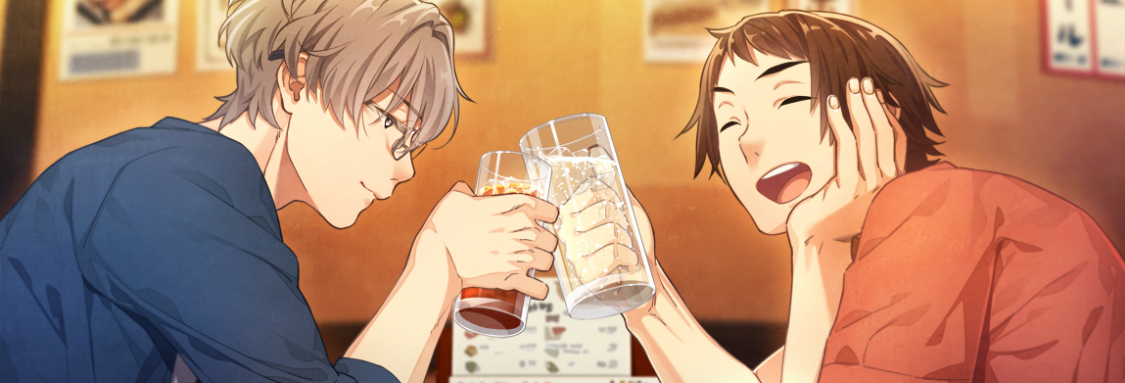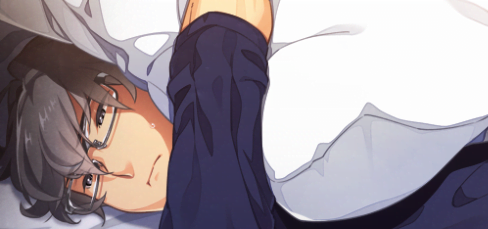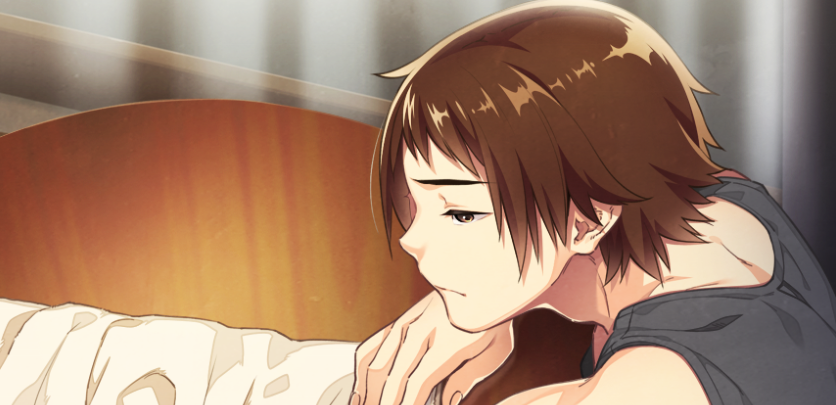Room No. 9
Content warnings: This
game is 18+ and intended for adults only. This game contains explicit
depictions of sexual content, dubcon, violence, arm/hand mutilation,
psychological torture, scatological imagery, internalized homophobia,
and mentions of child abuse.
There is non-explicit (but prevalent) discussion of sexual content on
this page. I do talk about major themes in the game, but don't give any
specific spoilers regarding plot points or endings.

"Boy, I sure hope we have a great time in Okinawa, Seiji!"
Left: Seiji Azumi || Right: Daichi Kobayashi
---
As always, I have returned with a post about a horrific and upsetting
visual novel that I discovered entirely on accident. This time, the
subject in question is Room No. 9, a psychological horror BL
game by the company Parade. I had never heard of Parade or any of their
three games, of which Room No. 9 was the second released, and stumbled
upon it accidentally when I saw it mentioned as a game 'similar to'
sweet pool. Of course, I was immediately sucked in by this comparison,
and after reading a review of it, it absolutely haunted me. For a solid
two to three days it was the only thing that I could think about, and I
finally caved and decided to play it. Do I regret that decision? I
might, actually.

(pictured above: the hubris of man who has not yet seen the horrors)
Room No. 9 centers around the protagonist, Daichi Kobayashi, and his
best friend, Seiji Azumi. The two are college students who have been
friends since middle school, and the game begins when they meet up to go
drinking to celebrate the end of Seiji's exams. Daichi laments a recent
breakup with his newest girlfriend, and the two decide to take advantage
of a resort reservation that Daichi had already made in advance. Thus,
they head to Okinawa, ready to enjoy ten full days of fun and
relaxation.
However, upon reaching Okinawa, their vacation plan screeches to a halt
when they wake up in a hotel room with no recollection of how they
arrived. There's a digital screen in place of their window, the exit
door is tightly locked, and they are welcomed only by a cold and
clinical television screen that details their participation in a
'behavioral study'.
Every day, for ten days, they will be given a choice between two tasks.
If they complete a task successfully, they will be awarded ten points
and their meals for the next day, and when they reach a total of 100
points, they are free to leave. Refusal to complete an assigned task by
the end of the day means they will receive neither points nor food, and
if their behavior is deemed too uncooperative or unruly, there will be
swift punishment.

It quickly becomes apparent after the first few days that there is a
pattern to these tasks: either Daichi must sexually debase Seiji, or
Seiji must physically mutilate Daichi. The choice of which task to
execute is left entirely up to the two men themselves, though from a
gameplay standpoint, a large majority of the tasks are decided without
player input. With each completed task, the severity of their next
assignment is increased. The game follows the two best friends over the
course of ten days as the moral quandries of their situation slowly
overtake them.
---
Room No. 9 was an absolutely fascinating and deeply haunting story that
affected me much, much more strongly than I ever could have anticipated.
As somebody who finds the overlap and contrast between sex and violence
one of the most interesting topics imaginable, I thought that this game
would be a twistedly enjoyable trek through performative gore that I would
play once, get freaked out by at the appropriate moments, and probably
never play again. I could not have been more wrong.
I am a very sensitive person when it comes to media, in the fact that I
react very strongly to it, but I genuinely played a solid 60% of this
game with tears in my eyes. I got viscerally sick to my stomach multiple
times and even contemplated not finishing it because it made me so
upset. This wasn't due to the severity of the content itself - although
the violent tasks did make me very uncomfortable with how realistic they
felt - but because of the tone of the game itself and the way the tasks
weighed so heavily on the characters. In fact, I was relieved
whenever Daichi would be hurt, because he bounced back much quicker from
pain than Seiji could from the sexual tasks.

Forced sexual content is usually something that I can handle fairly well
in media, though more realistic depictions and certain aspects of it
make it very hard for me to move past, but the way it was portrayed in
this game made me physically ill. All of the tasks are, technically,
consensual - Seiji and Daichi have lengthy conversations about what
they're going to do, and they affirm multiple times that they are okay
with it. But of course, they're not - how could they be okay
with any part of this situation?
What makes it even more uncomfortable is that Daichi genuinely can
handle being tortured physically, but we watch as Seiji, after each of
his tasks, crumbles under the disgust of what is being done to him.
However, Daichi and Seiji care about each other so much that instead of
turning on each other under the pressure of their situation, they
instead fight to be the victim. Daichi insists that he's used to being
hurt because of how he was physically abused as a child, while Seiji
argues that being sexually abused won't leave lasting scars on his body
and that he can just ignore it if he tries hard enough. Each one of them
makes a compelling, desperate argument that leaves the player at a loss
for what the 'right' answer is - if there even is a right
answer in a situation like this.

Regardless of who is being explicitly harmed on any given day, both
Daichi and Seiji are suffering. For both of them, being the agressor is
much more painful than being the victim. Both characters wrestle
endlessly with this impossible dilemma - it would be so much easier
if he hurt me, because I don't want to hurt him. But making him hurt me
is already hurting him in a different way. The fact that the two of
them prioritize each other makes every interaction feel hopeless,
because instead of selfishly protecting themselves, both of them lose no
matter what they choose to do. To further complicate matters, as the
days go on, Daichi begins to realize that he may have some unresolved
romantic and sexual feelings for Seiji.
Or does he? Has he always felt this way, or is his mind just
trying to excuse the actions he's being forced to perform on his best
friend? Is he enjoying this? Is he reacting to these events because he's
attracted to Seiji, or because the idea of hurting somebody is exciting
to him? If they weren't forced to do these things, would he still want
to? For Daichi, whose friendship with Seiji is literally the most
important thing in his life, these confusing and alarming feelings tear
him apart as he struggles to repress anything that might get in the way
of their friendship. All he wants most in the world is for him and Seiji
to stay best friends, no matter what, and the idea of anything changing
their relationship is horrifying to him. Can they remain
friends? And can they even remain the same people they were before they
stepped foot in this room?
There are six endings in the game, and a wealth of settings in the menu
as well. There is a toggle for whether or not to show grotesque imagery,
and a seperate toggle for... scatological imagery, which, yes, does show
up near the end of the game. The tasks are all announced ahead of time
so you can determine what the characters are about to do and prepare
yourself for it. There is no toggle for sexual imagery in the uncensored
version, thus all of the CGs are explicit and non-mosaic. In the
advanced playstyle settings, you can turn on 'Easy Mode', which tells
you which endings each choice leads to.
Playing this game absolutely put me through the wringer. I can't
remember the last time that something hit me so viscerally and
painfully, and I'm not even sure if I could articulate the exact reasons
that it hurt me so much without digging into some very personal issues.
I also don't think I would recommend it to anyone - not because it's
lacking in quality, but because it affected me so much that I wouldn't
want the same thing to happen to anyone else. I have still yet to parse
through all of my feelings regarding this game. I can't even say for
certain that I'm glad that I played it - but it is definitely
fascinating, I can say that for sure. I have to take my hat off to the
team behind it for making one of the most haunting pieces of media I've
experienced in quite a while.